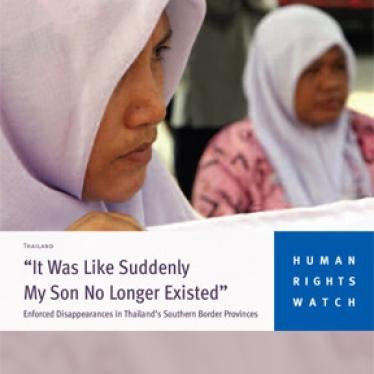(New York) - The new government of Thailand should ensure that those responsible for the enforced disappearance and presumed murder of prominent Muslim human rights lawyer, Somchai Neelappaijit, are finally brought to justice, Human Rights Watch said today, five years after his abduction.
On March 12, 2004, Somchai was assaulted and pulled from his car in Bangkok, allegedly by five police officers. He was never seen again. Somchai was chairman of Thailand's Muslim Lawyers Association and vice-chairman of the Human Rights Committee of the Lawyers Council of Thailand. At the time, he was investigating and reporting on widespread police torture of Muslims in the insurgency-ridden southern border provinces.
In a much-publicized attempt to demonstrate his commitment to human rights and the rule of law, Prime Minister Abhisit Vejjajiva on January 21, 2009, ordered the Royal Thai Police and the Justice Ministry to accelerate their investigation into the case.
"Somchai's ‘disappearance' reflects glaring problems of state-sponsored abuses in Thailand," said Brad Adams, Asia director at Human Rights Watch. "While Prime Minister Abhisit's order is a good sign, actions speak louder than words. Now is the time to show concrete progress in the investigation and to bring the perpetrators to justice."
Four Thai prime ministers in the past five years - Thaksin Shinawatra, Gen. Surayud Chulanont, Samak Sundaravej, and Somchai Wongsawat - have acknowledged that police and government officials were involved in Somchai's abduction and killing. But none of them brought the perpetrators to justice. Key questions remain unanswered, including who ordered the abduction and presumed killing of Somchai and who was involved in obstructing justice.
Five police officers - Police Maj. Ngern Tongsuk, Police Lt. Col. Sinchai Nimbunkampong, Police Lance Cpl. Chaiweng Paduang, Police Sgt. Rundorn Sithiket, and Police Lt. Col. Chadchai Leiamsa-ngoun - were arrested in April 2004 in connection with Somchai's case and charged with coercion and robbery. None were charged with the more serious crimes of abduction or other offenses connected to the enforced disappearance.
On January 12, 2006, the Central Criminal Court found Police Maj. Ngern guilty of physically assaulting Somchai, and sentenced him to three years in prison. The other four police officers were acquitted.
Police Maj. Ngern, who had been free on bail while appealing his case, was reported "missing" in a mudslide on September 19, 2008 while supervising his construction business on the Thai-Burmese border.
The assistant national chief, Police Lt. Gen. Aswin Kwanmuang, who was hand-picked by Prime Minister Abhisit to supervise the investigation, was quoted in media reports on January 27 as saying: "Police involvement in this case has obstructed the investigation. With strong backing from the new government, the sky is now clearing up and progress can be made. First, we must find Somchai's body. After that, arrest warrants on additional suspects will be issued. No one will be spared, including senior police officers."
"The prominence of Somchai's case has made it difficult for Thai authorities to look the other way," said Adams. "Solving this case will give hope to many, including in the south, that powerful people can be held accountable."
While efforts to investigate and prosecute the case have been extremely weak, Somchai's case is the only enforced disappearance that has led to any prosecution or has received significant attention from Thai authorities. In a March 2007 report, "It Was Like Suddenly My Son No Longer Existed," Human Rights Watch documented a pattern of enforced disappearances and other abuses by the security forces. Successive governments have done nothing to hold abusive officers accountable for serious crimes.
Human Rights Watch called upon the Thai government to nullify the 2005 Emergency Decree on Government Administration in Emergency Situations (Emergency Decree) and repeal the 1914 Martial Law Act in order to protect the basic rights of all Thais and bring Thai law into conformity with international standards.
Human Rights Watch said that the Thai government has enforced laws and regulations in a way that increased the vulnerability of suspects in the southern border provinces, leaving them vulnerable to torture, "disappearance," and extrajudicial killing during pre-charge detention.
The Martial Law Act allows seven days of pre-charge detention. After that, suspects can be detained for another 30 days under the Emergency Decree, which was issued by the government of Thaksin Shinawatra. (See Human Rights Watch analysis of the Emergency Decree in a letter to Thaksin, dated August 4, 2005: https://www.hrw.org/english/docs/2005/08/04/thaila11592.htm ). Suspects are also prohibited from having access to family and lawyer visits during the first 72 hours of their detention.
Resentment against human rights abuses by Thai authorities is among the factors fueling an increasingly brutal insurgency in southern Thailand in which separatist militants have carried out a string of deadly attacks on civilians and security forces - shooting, bombing, beheading, and arson attacks - over the past five years.
A policy statement Prime Minister Abhisit delivered to Parliament on December 30 stressed that justice will be integral to resolution of the conflict in the southern border provinces, which has claimed more than 3,500 lives since January 2004.
Human Rights Watch urged Prime Minister Abhisit to take all necessary steps to stop the practice of enforced disappearances, including making enforced disappearance a specific criminal offense and ratifying the International Convention for the Protection of All Persons from Enforced Disappearance. In addition, Thai authorities should ensure that all persons detained by law enforcement and security forces are held at recognized places of detention, and are not subjected to torture or cruel, inhuman, or degrading treatment. Authorities should immediately make the whereabouts of detainees known to family and lawyers.
"Prime Minister Abhisit needs to show political courage to end once and for all the enforced disappearances by the security forces," said Adams. "This is the only way to ensure that justice in Thailand is not also put on the list of the ‘disappeared'."







